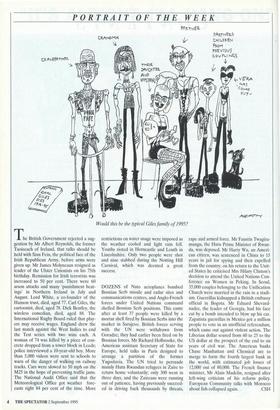PORTRAIT OF THE WEEK
Would this be the typical Giles family of 1995?
The British Government rejected a sug- gestion by Mr Albert Reynolds, the former Taoiseach of Ireland, that talks should be held with Sinn Fein, the political face of the Irish Republican Army, before arms were given up. Mr James Molyneaux resigned as leader of the Ulster Unionists on his 75th birthday. Remission for Irish terrorists was increased to 50 per cent. There were 60 arson attacks and many 'punishment beat- ings' in Northern Ireland in July and August. Lord White, a co-founder of the Hanson trust, died, aged 77. Carl Giles, the cartoonist, died, aged 78. Dick Bentley, the wireless comedian, died, aged 88. The International Rugby Board ruled that play- ers may receive wages. England drew the last match against the West Indies to end the Test series with two wins each. A woman of 74 was killed by a piece of con- crete dropped from a tower block in Leeds; police interviewed a 10-year-old boy. More than 5,000 videos were sent to schools to warn of the danger of walking on railway tracks. Cars were slowed to 50 mph on the M25 in the hope of preventing traffic jams. The National Audit Office said that the Meteorological Office got weather fore- casts right 84 per cent of the time. More
restrictions on water usage were imposed as the weather cooled and light rain fell. Youths rioted in Horncastle and Louth in Lincolnshire. Only two people were shot and nine stabbed during the Notting Hill Carnival, which was deemed a great success.
DOZENS of Nato aeroplanes bombed Bosnian Serb missile and radar sites and communications centres, and Anglo-French forces under United Nations command shelled Bosnian Serb positions. This came after at least 37 people were killed by a mortar shell fired by Bosnian Serbs into the market in Sarajevo. British forces serving with the UN were withdrawn from Goradze; they had earlier been fired on by Bosnian forces. Mr Richard Holbrooke, the American assistant Secretary of State for Europe, held talks in Paris designed to arrange a partition of the former Yugoslavia. The UN tried to persuade mainly Hutu Rwandan refugees in Zaire to return home voluntarily; only 300 went in three days, and the Zaireans were running out of patience, having previously succeed- ed in driving back thousands by threats, rape and armed force. Mr Faustin Twagira- mungu, the Hutu Prime Minister of Rwan- da, was deposed. Mr Harry Wu, an Ameri- can citizen, was sentenced in China to 15 years in jail for spying and then expelled from the country; on his return to the Unit- ed States he criticised Mrs Hilary Clinton's decision to attend the United Nations Con- ference on Women in Peking. In Seoul, 35,000 couples belonging to the Unification Church were married in the rain in a stadi- um. Guerrillas kidnapped a British embassy official in Bogota. Mr Eduard Shevard- nadze, the leader of Georgia, had his face cut by a bomb intended to blow up his car. Zapatista guerrillas in Mexico got a million people to vote in an unofficial referendum, which came out against violent action. The Liberian dollar soared from 60 to 25 to the US dollar at the prospect of the end to six years of civil war. The American banks Chase Manhattan and Chemical are to merge to form the fourth largest bank in the world, with estimated job losses of 12,000 out of 80,000. The French finance minister, Mr Alain Madelin, resigned after left-wing criticism of his reform policy. European Community talks with Morocco about fish collapsed again. .CSH


















































 Previous page
Previous page